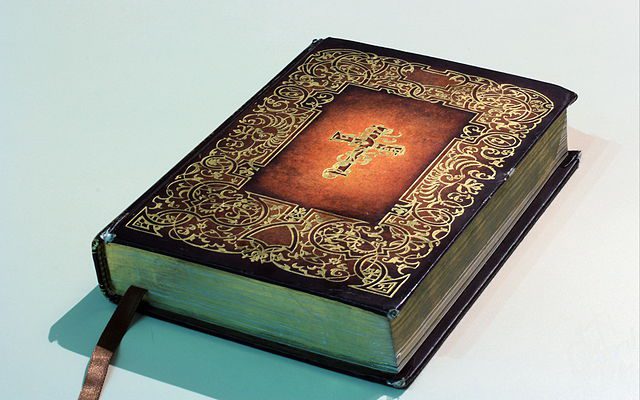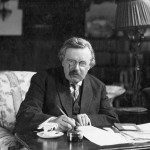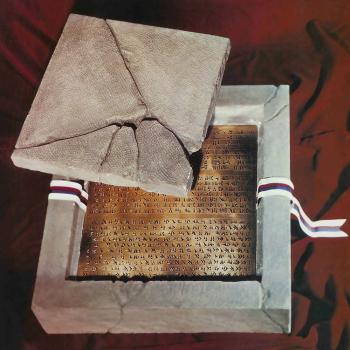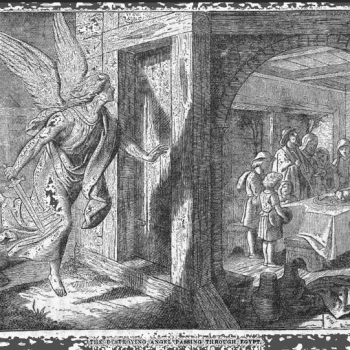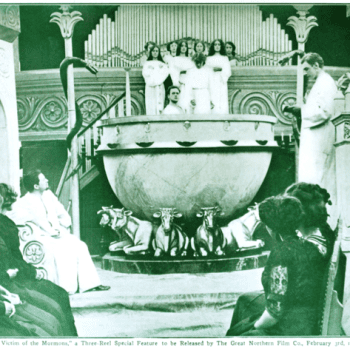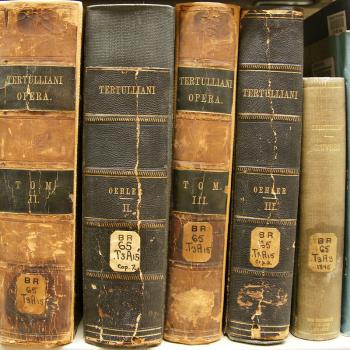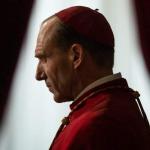[7 October 2003]
* * * * *
I would argue that the office of the papacy is explicitly indicated in the Bible itself. Everything we need to establish the papacy in all essentials is in the Bible. The papacy is explicit in the same way that the Trinity is explicit: there are solid proofs in the Bible, yet these would not be fully-understood or worked-out in all detail for hundreds of years. No one can deny this.
All the essentials (Petrine primacy, jurisdiction, relation to other bishops, Rock, the keys, etc.) are all directly mentioned. They don’t even need to be deduced, whereas many elements even of trinitarian doctrine are not stated outright and need to be deduced. We wouldn’t expect them to be spelled out in particularistic detail.
There is a ton of deductive material indicating the Trinity and many direct proofs also – much more overall than for the papacy -, yet I think the types of evidence are not qualitatively different in both cases.
For a doctrine such as, for example, the Assumption of Mary, on the other hand, I would say that the biblical evidence is deductive-only, and even then not exegetically obvious, even in an indirect sense, as I think the papacy and the Trinity both are.
I think one can make a cogent biblical argument for Mary’s Assumption (at least an analogical one, and a demonstration – at the very least – that it is not contradictory to anything in the Bible, as is often claimed), but it is relatively weak (especially in Protestant eyes) compared to that for other Catholic doctrines. I think the biblical case for the papacy is quite strong, relative to the case for other Catholic distinctives. And this is the specialty of my apologetics, as you probably know . . .
Furthermore, one needs to distinguish between the “office of the papacy” being “explicitly indicated in the Bible itself” and every aspect and later development of it being explicitly indicated. To say that the office and the essence of a thing is explicitly indicated is not to say that the later development in all its aspects is indicated (certainly not in its 1870 form – which was, incidentally, prefigured in almost all respects at least as early as St. Francis de Sales in 1596).
I always agree with Cardinal Newman (at least so far); my view in matters of development will not differ in any serious way from his. He is the Catholic thinker I admire the most. The doctrine develops, and understanding of it develops, in any case.
If obedience to the pope (or Peter, as the universal bishop with supreme authority and the final say) is taught there [in Scripture] (the keys, the Rock, binding and loosing, etc.), then it’s there (a = a). It is as foolish to make out that something fundamentally changed (as opposed to developed) in this regard in the 11th century as to make out that something changed fundamentally in 100 AD (after the apostles died) or 313 (Constantine and the state establishment of Christianity) or 461 (after Pope St. Leo the Great’s reign) or in 604 (after Pope St. Gregory the Great’s reign), or after 1054 (when subsequent previously-necessary ecumenical councils mysteriously ceased to exist, so the Orthodox tell us). People make all these arguments (and quite often), but they are all equally groundless and arbitrary.
The Church is what it is, guided and protected by the Holy Spirit, and nothing essential changes in one day or one year (despite all the human corruption that should surprise no one at all). To think otherwise is to engage in rationalistic post-Enlightenment, theologically-liberal-influenced historiography, not a view of Church history rooted in Christian faith and a Christian intellectual worldview, grounded in the Bible itself (which teaches divine protection from error: Jn 16:13, and indefectibility: Mt 16:18, Jude 3, etc.).
This sort of critique against the Catholic view on Church history is little different in spirit or content than theologically-liberal theologians and historians going after Christian history (including Protestant and Orthodox history also).
Some Protestants deny that all the essential aspects of the papacy are in the Bible at all. That is what I object to. The essence of the papacy is all in the Bible, or “full-blown” there. It would be ridiculous to be saying that it was “full-blown” in the sense of the 1870 definition. For that would involve the following contradiction:
1. The papacy in the Bible was taught as explicitly and was as fully developed as the 1870 ex cathedra definition of papal infallibility.
2. The papacy developed for over 1800 years till it was fully and explicitly defined in the 1870 ex cathedra definition of papal infallibility.
Infallibility (or, we might say, the “non-negotiability of true doctrine”) itself is a biblical concept: “the gates of hell shall not prevail against the Church,” “the Holy Spirit will guide you into all truth,” etc. It is presupposed in the notion of one apostolic deposit (Acts 2:42, Jude 3) and Paul’s “tradition” that he repeatedly urges his churches to maintain or keep. The Jerusalem Council issued its decree and any straightforward reading would lead a person to believe that it was considered binding and therefore infallible. The Council Fathers even appealed to the Holy Spirit, almost exactly as Catholics would say that ecumenical councils are guided by the Holy Spirit (Acts 15:28; cf. 15:25).
On the other hand, particular aspects of infallibility (exactly when and how it applies, and its application to Councils and popes) is what developed throughout history. So again, I would say that the essential notion was clearly expressed in the Bible (even casually assumed, I would argue, in a broader sense).
Whether something can be “proven” by the Bible alone and whether it developed throughout history are two distinctly different questions to resolve. I was simultaneously doing two things: arguing that all the essentials are in the Bible, and that the papacy both developed and was not fully understood until after many centuries of development. To be established from the Bible alone is not a requirement in Catholic thinking, because we don’t believe in sola Scriptura.
In this instance, I happen to believe that the papacy can be so demonstrated from the biblical data in its essence. What Cardinal Newman believed on this exact point in 1845 is not totally clear to me. But his Essay on Development was a strictly historical, not exegetical work.
We would not expect Cardinal Newman to believe in explicit biblical proofs for the papacy in 1845, when he first wrote his Essay on Development, since he was still an Anglican when he wrote it (though he converted right afterwards). This is yet more proof that he wasn’t trying to defend something he already believed, and to force history to conform to it. To the contrary, he was looking at history, and in so doing, became convinced that the Catholic perspective on Church history was more consistent with the facts than the Anglican Via Media.
But we learn more about what he thought about the biblical evidence for the papacy after his conversion, in a sermon from October 7, 1866, preached in Church of the Oratory in Birmingham, England. It is recorded in his Sermons Preached on Various Occasions (1874), as Sermon 15, “The Pope and the Revolution,” pp. 281-316. I shall cite portions particularly related to the Bible:
“And I say to thee, that thou art Peter, and upon this rock I will build My Church; and the gates of hell shall not prevail against it. And I will give to thee the keys of the kingdom of heaven.” Matt. xvi. 18, 19.
. . . He speaks of Himself in the Apocalypse as “Him who is the Holy {283} and the True, Him that hath the key of David (the key, that is, of the chosen king of the chosen people), Him that openeth and no man shutteth, that shutteth and no man openeth.” And what our Lord, the Supreme Judge, is in heaven, that was St. Peter on earth; he had those keys of the kingdom, according to the text, “Thou art Peter, and upon this rock I will build My Church, and the gates of hell shall not prevail against it. And I will give to thee the keys of the kingdom of heaven; and whatsoever thou shalt bind upon earth, shall be bound also in heaven; and whatsoever thou shalt loose on earth, shall be loosed also in heaven.”
Next, let it be considered, that kingdom, which our Lord set up with St. Peter at its head, was decreed in the counsels of God to last to the end of all things, according to the words I have just quoted, “The gates of hell shall not prevail against it.” And again, “Behold, I am with you all days, even to the consummation of the world.” And in the words of the prophet Isaias, speaking of that divinely established Church, then in the future, “This is My covenant with them, My Spirit that is in thee, and My words which I have put in thy mouth, shall not depart out of thy mouth, nor out of the mouth of thy seed, nor out of the mouth of thy seed’s seed, saith the Lord, from henceforth and for ever.” And the prophet Daniel says, “The God of heaven will set up a kingdom that shall never be destroyed . . . and it shall break in pieces and shall consume all those kingdoms (of the earth, which went before it), and itself shall stand for ever.”
That kingdom our Lord set up when He came on {284} earth, and especially after His resurrection; for we are told by St. Luke that this was His gracious employment, when He visited the Apostles from time to time, during the forty days which intervened between Easter Day and the day of His Ascension. “He showed Himself alive to the Apostles,” says the Evangelist, “after His passion by many proofs, for forty days appearing to them and speaking of the kingdom of God.” And accordingly, when at length He had ascended on high, and had sent down “the promise of His Father,” the Holy Ghost, upon His Apostles, they forthwith entered upon their high duties, and brought that kingdom or Church into shape, and supplied it with members, and enlarged it, and carried it into all lands. As to St. Peter, he acted as the head of the Church, according to the previous words of Christ; and, still according to his Lord’s supreme will, he at length placed himself in the See of Rome, where he was martyred.
And what was then done, in its substance cannot be undone. “God is not as a man that He should lie, nor as the son of man, that He should change. Hath He said then, and shall He not do? hath He spoken, and will He not fulfil?” And, as St. Paul says, “the gifts and the calling of God are without repentance.” His Church then, in all necessary matters, is as unchangeable as He. Its framework, its polity, its ranks, its offices, its creed, its privileges, the promises made to it, its fortunes in the world, are ever what they have been.
Therefore, as it was in the world, but not of the world, in the Apostles’ time, so it is now: – as it was “in honour and dishonour, in evil report and good {285} report, as chastised but not killed, as having nothing and possessing all things,” in the Apostles’ times, so it is now: – as then it taught the truth, so it does now; as then it had the sacraments of grace, so has it now; as then it had a hierarchy or holy government of Bishops, priests, and deacons, so has it now; and as it had a Head then, so must it have a head now. Who is that visible Head now? who is now the vicar of Christ? who has now the keys of the kingdom of heaven, as St. Peter had then? Who is it now who binds and looses on earth, that our Lord may bind and loose in heaven? Who, I say, if a successor to St. Peter there must be, who is that successor in his sovereign authority over the Church? It is he who sits in St. Peter’s chair: it is the Bishop of Rome. We all know this; it is part of our faith; I am not proving it to you, my Brethren. The visible headship of the Church, which was with St. Peter while he lived, has been lodged ever since in his Chair: the successors in his headship are the successors in his Chair, that continuous line of Bishops of Rome, or Popes, as they are called, one after another, as years have rolled on, one dying and another coming, down to this day, when we see Pius the Ninth sustaining the weight of the glorious Apostolate, . . .
{286} . . . like St. Peter, he is the Vicar of his Lord. He can judge, and he can acquit; he can pardon, and he can condemn; he can command and he can permit; he can forbid, and he can punish. He has a Supreme jurisdiction over the people of God. . . . we must never murmur at that absolute rule which the Sovereign Pontiff has over us, because it is given to him by Christ, and, in obeying him, we are obeying his Lord. We must never suffer ourselves to doubt, that, in his government of the Church, he is guided by an intelligence more than human. His yoke is the yoke of Christ, he has the responsibility of his own acts, not we; and to his Lord must he render account, not to us.
His previous Anglican views, as of 1842, can be seen in his Sermon 17, “The Unity of the Church,” from Parochial and Plain Sermons.
I believe, and Cardinal Newman believes, that all doctrines develop. Whether they are explicit with massive indications in the Bible (e.g., the deity of Christ or salvation by grace alone) or only indirectly deduced (Mary’s Assumption), or derived from much direct implicit evidence (e.g., original sin), or just a few very explicit verses (e.g., the Virgin Birth) is a somewhat subjective question, on which good men in good faith can differ. But it is a separate question from subsequent development. The Newman of 1866 argues largely from a point of view that I hold myself (in some respects he even brings more biblical indications to the table). He probably didn’t believe those things in 1845. In any event, the two arguments exist side-by-side and there is no inconsistency whatsoever in my argument. It’s subtle and a bit complex, but it is coherent and consistent.
Cardinal Newman was simply trying to show that the papacy developed like other doctrines, and that the principles of development were the same for all true doctrines.
Oftentimes in these sorts of semantic discussions, the entire problem turns upon various definitions.
In any event, I am not arguing from a sola Scriptura position. It may seem at times like I am, because my emphasis is on biblical evidence, but that doesn’t mean that I ever adopt sola Scriptura — not for a moment. I have opposed that position more than any other Protestant doctrine, in my writings.
The largest paper on my website was my recent dialogue on whether the Fathers believed in sola Scriptura. Of course they did not, and I believe that I conclusively demonstrated this, in the case of ten Fathers. When I argue from Scripture, I am being very “patristic” (like, e.g., St. Athanasius – see below). But – also like the Fathers -, my “final court of appeal” is to Tradition and Holy Mother Church.
Secondly, note that St. Vincent writes: “the canon of Scripture is complete, and sufficient of itself for everything, and more than sufficient.” This seems to me to be the notion of material sufficiency of Scripture, which is precisely the ground on which I am arguing (and Cardinal Newman agrees with this as well).
So the papacy is in the Bible, just like all other doctrines. At the same time, it developed (also like all other doctrines) and needed to be better applied and understood with the passage of time. And the Church’s interpretation was decisive, rather than the mere Bible text alone (formal sufficiency) That is my position, and it is Newman’s and St. Vincent’s (whose thought he took as his starting-point when he turned his attention to development of doctrine).
My overall viewpoint on the relationship of Scripture to Tradition was carefully expressed in the Introduction to my first book, A Biblical Defense of Catholicism:
The present work endeavors to show that Catholicism can more than hold its own with regard to the evidence of the Bible, as it relates to distinctive doctrines which are considered unbiblical or even anti-biblical by many evangelical Protestants . . .
. . . The more I studied Catholic apologetic works (many of which were older books obtained at used bookstores), the more I realized what a wealth of biblical material existed in favor of Catholic positions on a number of “controversial” doctrines.
I was continually amazed at the depth and solidity of these arguments, and pleasantly surprised that the Bible, which I had loved and studied intensely for ten years, could so confidently be utilized as a bulwark in defense of the Catholic faith. Catholicism, rightly understood, is – I believe strongly – an eminently and thoroughly biblical belief system.
. . . Time and time again, I discovered that Catholicism is altogether consistent with biblical teaching. Many claim that distinctive Catholic beliefs are simply not found in Scripture. Often, however, those who present this charge have little or no understanding of the notion of the development of doctrine, implicit biblical evidence, or the complementary (and biblically-based) roles of Tradition and the Church. All of these factors and other related ones will be examined in this work.
Catholics need only to show the harmony of a doctrine with Holy Scripture. It is not our view that every tenet of the Christian faith must appear whole, explicit, and often, in the pages of the Bible. We also acknowledge Sacred Tradition, the authority of the Church, and the development of understanding of essentially unchanging Christian truths, as is to be expected with a living organism (the Body of Christ) guided by the Holy Spirit. A belief implicitly biblical is not necessarily anti-biblical or unbiblical. But we maintain that the Protestant principle of sola Scriptura, on the other hand, is incoherent and – I dare say – quite unbiblical.
In fact, many doctrines accepted by Protestants are either not found in the Bible at all (for example, sola Scriptura and the Canon of Scripture), are based on only a very few direct passages (for example, the Virgin Birth), or are indirectly deduced from many implicit passages (for example, the Trinity, the Two Natures of Jesus, many attributes of God such as His omnipresence and omniscience).
. . . Far from having to force the Scripture to conform to Catholic teaching, or to equivocate, or to rationalize away glaring contradictions, I’ve found that – invariably and delightfully – the converse is true: Catholicism is indeed the round peg, so to speak, that naturally fits into the round hole of Scripture. I have not undergone any torments of conscience or “intellectual suicide” in this endeavor, and I am more confident than ever that the Catholic Church is the “Bible Church” par excellence.
. . . The non-Catholic can – after grappling with facts and arguments such as those presented herein – eventually recognize that Catholics are able to put forth a very strong biblical case for their beliefs.
. . . It is not my intention to minimize the importance of Tradition, Councils, papal pronouncements, and suchlike, at all. Rather, I seek to exhibit as many of the biblical evidences as can be brought to bear on any particular distinctively Catholic doctrine (at least all that I’ve personally found – certainly more exist).
That was written sometime before May 1996 (when I completed my book). I clarified my view of this relationship in much greater depth and detail (developed, but with the same essence!!!) seven years later, in a dialogue in June 2003 on this board: “The Sufficiency of Scripture and the Church Fathers (Particularly, St. Athanasius and the Trinity)”:
We claim that apostolic Tradition is necessary along with Sacred Scripture. This was the patristic principle, and how they invariably fought the heretics. The biblical arguments provided the “meat” of their arguments, but in the end they would appeal to the Tradition of “what had always been believed everywhere by everyone” (St. Vincent of Lerin’s dictum – the Commonitorium . . .
. . . Tradition must play the decisive role in such situations by asserting “this is what orthodox Christianity holds.” Hence, the need for creeds (and confessions, in the Protestant traditions, ostensibly based on Scripture Alone and some semblance of orthodoxy-throughout-history, even though operating on a different formal principle than Catholicism or Orthodoxy).
. . . Material sufficiency is believed in by everyone that I know. This is why there are several books now which defend Catholicism from the Bible, such as my own first book . . . This does not imply an advocacy of formal sufficiency; only material sufficiency and a belief that Catholic doctrines are as well or more grounded in Scripture than Protestant ones. It is, in effect, Catholics, saying, “you want to argue doctrines based on the standard of Bible Alone? We can match you there as well. We aren’t afraid to subject our views to the most intense biblical scrutiny and exegesis.”
. . . Entire books are written about the Fathers’ supposed belief in sola Scriptura, when in fact they are merely expressing their belief in material sufficiency of Scripture, and its inspiration and sufficiency to refute heretics and false doctrine generally. It is easy to misleadingly present them as sola Scripturists if their statements elsewhere about apostolic Tradition or succession and the binding authority of the Church (especially in council) are ignored. But a half-truth is almost as bad as an untruth (arguably worse, because in most instances the one committing it should know better).
. . . I think one could definitely argue that trinitarianism is not crystal-clear and explicit in Scripture. This follows from the historical fact that trinitarianism in all its Chalcedonian fullness was the end-result of a process that took over 400 years. That is not insignificant.
. . . If Chalcedonian trinitarianism and the Two Natures of Christ, etc. were explicitly biblical notions then the theology of same would have been fully-developed by maybe 150-200 A.D. (?) or perhaps even earlier.
But is Scripture sufficient to refute Arianism on its own (which is a different question)? I think so, . . .
. . . Nevertheless, I think it is also true that if a person was in a hypothetical situation where they knew absolutely nothing of Church history, Christian theology, and precedent in how these doctrines were and are thought about and derived from Scripture, and was tossed a Bible, that modalism (aka Sabellianism) and Arianism might seem as “plausible” to them as trinitarianism seemed. After all, the Trinity is not an easily-grasped doctrine, and it is not immediately accessible to human reason. It is a revelation and mystery which must ultimately be accepted in faith (not to undermine its scriptural proofs).
So, while wholeheartedly agreeing with you that the case can be made by Scripture, I think we fool ourselves if we don’t recognize the role of Tradition and precedent as a strong influencing factor in how we all think. Most of us have grown up in cultures and/or households where trinitarianism and the Deity of Christ was taken for granted. It was the air we breathed.
But if one grew up in a secular context or was completely ignorant of historic theology, sure, I could see how they could grab a Bible and conclude that it taught Arianism or modalism (which is quite a bit more subtle). Of course, I agree that this would be an opinion based in ignorance of the totality of Scripture teaching and proper exegesis and hermeneutics and lack of understanding of difficult passages where commentary is most helpful. But one could still do it.
. . . As I have stated repeatedly, binding Church authority, is a practical necessity, given the propensity of men to pervert the true apostolic Tradition as taught in Scripture, whether it is perspicuous or not. The fact remains that diverse interpretations arise, and a final authority outside of Scripture itself is needed in order to resolve those controversies. This does not imply in the least that Scripture itself (rightly understood) is not sufficient to overcome the errors. It is only formally insufficient by itself.
. . . I write entire books and huge papers in the same fashion [quoting all or mostly Scripture, as St. Athanasius did – so my opponent argued]. It doesn’t mean for a second that I don’t respect the binding authority of the Catholic Church or espouse sola Scriptura . . . Making such arguments, doing exegesis, extolling the Bible, reading the Bible, discussing it, praising it, etc., etc., etc., are all well and good (and Catholics agree wholeheartedly); none of these things, however, reduce to or logically necessitate adoption of sola Scriptura as a formal principle, hard as that is for some people to grasp.
. . . I have shown, I think, that St. Athanasius did not deny the Catholic three-legged stool, and I recognize in his approach exactly that of the Catholic approach today and throughout history. I just don’t see this supposed disconnect between present-day Catholic apologetics and patristic methodology and formal principles of authority.


